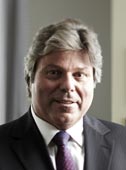The Transition to
Competency by
Design for All Surgical
Specialties

Ron Levine
|
Competency-Ba s e d
Medical Education
(CBME) involves implementing
outcomes-driven
assessment to ensure
physicians possess the
knowledge and abilities
they need for every stage
of their career. The Royal
College is ushering in a
new era of CBME in
Canada with the introduction
of Competency
by Design (CBD). Canada’s medical education is rooted
in a time-based model. The plan for CBD is to shift to a
plan in which more emphasis is placed on regular assessment
of performance.
We are still in the time - based apprentice model,
which turned out good surgeons, so we know that the
system works. For excellent, very good and good residents
our training program is quite satisfactory. It is not
so good for the fair or lower achieving residents. I was
a Program Director in Plastic Surgery for 16 years. I
sat at the end of residency with each candidate one on
one. The assumption was that if you got enough and
saw enough, you were competent. This was based on
no, or very few assessments - too much was assumed.
For the resident who is not doing well, earlier formal
assessment can identify the difficulty and a remediation
plan can be implemented. This can be done at a much
earlier stage and we do not have to wait until a resident
is in their senior year of training. The other advantage of
CBD is that it is possible that the resident will be able
to complete training in a shorter period of time. I like
CBC because it reduces subjectivity and the notion that
maybe one more rotation will fix the problem.
Orthopaedics at the University of Toronto is the
gold standard for competency by design teaching and
assessment. A lot of time and money went into its
development and at the present time, all residents in
Orthopaedics are in a competency based curriculum.
The Royal College has mandated CBD for all specialties.
All specialties and subspecialty programs in Canada will
adopt CBD in gradual phases. All disciplines divided
into 7 cohorts will begin their transition to CBD each
year until 2022. The first cohort is medical oncology and
otolaryngology. The second cohort includes two surgical
programs, specialties, Urology and Surgical Foundations.
CBD for each surgical specialty will be designed at
the national level by the discipline’s specialty committee
(program directors, clinician educators, continuing professional
development experts and invited guests) who will
collaborate with the Royal College to develop CBD for
that specialty. They will assign milestones and Entrustable
Professional Activities (EPAs) to each stage of training.
They will determine competency based assessment practices
and prepare faculty for CBD. CBD will look different
for each specialty and will depend on what the specialty
committee designs. The Postgraduate Medical Education
Office at the University of Toronto, under the lead of Dr.
Susan Glover-Takahashi, will help in the implementation
of CBD of each specialty in the Department of Surgery.
M. M. with contributions from Ron Levine
|
TORONTO SURGICAL ETHICS COURSE
Wednesday April 6th, 2016
Chestnut Conference Centre at 89 Chestnut St.
(http://www.cpd.utoronto.ca/generalsurgery/workshops/
toronto-surgical-ethics-course/)
0900-0910 |
Introduction
Ryan Snelgrove & Mark Camp |
0910-0930 |
“The elephant in the room”- Dealing with an
underperforming surgeon"
Mike Kim |
0930-0945 |
Breakout Groups |
0945-1025 |
Reports from the breakout groups, summation
and discussion
Mark Camp |
1025-1045 |
Coffee Break |
1045-1105 |
"Breaking the silence of the switch” - Trainee
participation in surgery
Chryssa McAlister |
1105-1120 |
Breakout Groups: |
1120-1200 |
Reports from the breakout groups, summation
and discussion
Mark Camp |
1200-1300 |
Lunch |
1300-1320 |
“A Mental Model for Surgical Decision Making:
Can We Fix It?
”
Gretchen Schwarze |
1320-1335 |
Breakout Groups |
1335-1415 |
Reports from the breakout groups, summation
and discussion
Ryan Snelgrove |
1415-1435 |
Coffee Break |
1435-1455 |
“No room in the inn”- Operating room prioritization
Mark Bernstein |
1455-1510 |
Breakout Groups |
1510-1550 |
Reports from the breakout groups, summation
and discussion
Ryan Snelgrove |
1550-1600 |
Participant course evaluations |
2ND ANNUAL BALFOUR LECTURE
IN SURGICAL ETHICS: “HIGH
STAKES SURGICAL DECISIONS AND
UNWANTED CARE”
Wednesday, April 6, 2016 - 5:00 p.m. – 6:00 p.m.
Peter Gilgan Centre for Research Tower
686 Bay Street, CRL Event Room 1
|
|